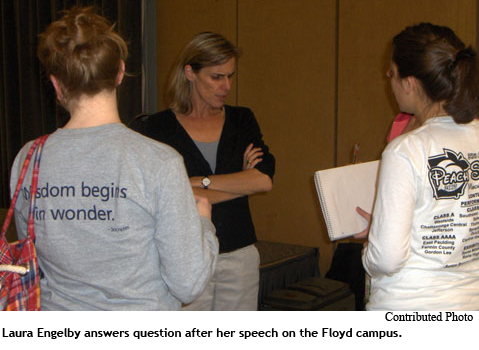NEWS |
|
Be sure to check out these other News articles:
Spring Fling goes 'Wild West' as students enjoy free food, country music, festivities
|
Engelby shares passion for marine life with studentsBy Kayla Amos
"Your life is intricately connected to the ocean," Engelby stated. "Both human and animals depend on it for survival." She said that marine mammals are "the sentinels of the sea." This means that scientists pay close attention to whales and dolphins because their behavior is a sign of what is going on in the ocean that may affect humans. A love of dolphins and the work of famous marine biologist Jacques Cousteau is what motivated Engelby's interest and career choice when she was just a teenager during the "Flipper" generation. Her work with marine mammals began small. She was in charge of crowd control at the dolphin shows at Six Flags as a teen. However, this job got her in touch with trainers and really allowed her up-close experiences with dolphins. "I had a clear mission in life," Engelby said, reminiscing. "I was like, 'I have to do this!'" Her clear mission and teenage dream have led to a successful 24-year career. Engelby's lecture on March 11 at 7 p.m. in the Lakeview Auditorium on the Floyd Campus was filled with pictures of various species of dolphins and whales, each with their own unique qualities. She spoke about dolphins' and whales' amazing ability to communicate through sonar. Today, Engelby works with NOAH (National Office of Amimal Health), an organization that helps to protect marine animals, and studies their habits. She calls it her "dream job." NOAH plays a big part in influencing government regulations regarding marine animals and even helps to create legislation to further protect endangered species. One such endangered species Engelby spoke about is the Southern Right Whale. Indigenous to the shores of the southern United States, the southern Right Whale is on the verge of extinction with a dwindling population of only 300 left. In fact, its only known calving area is off the coast of northeast Georgia. Already, Engelby has seen three species of whales and a dolphin become extinct in her lifetime and says she definitely doesn't want to see another species lost. A major threat to marine mammals such as the Southern Right Whale is humans. Pollution caused by reckless disposal of garbage and accidental vessel strikes threaten the lives of countless marine creatures each year. "When out on the water, take trash with you," Engelby reminded those in attendance. Engelby showed several pictures of marine animals who were living with discarded ropes cutting into their skin, binding their fins to the point where the animals could barely swim, and even cases that resulted in the death of the animal, all of which could have been easily prevented by humans simply disposing of trash properly. Engelby also warned about the dangers of illegal feeding, which can make dolphins and whales dependent upon humans for food sources. She concluded the session by answering several questions about her work and the animals she loves to work with. Engelby was the last speaker in the 2007-2008 GHC Community Speaker Series sponsored by The Office of Student Life. |
 Listening to marine biologist Laura Engelby speak, one can tell she has a true passion for her work, rescuing and protecting marine mammals such as dolphins and whales.
Listening to marine biologist Laura Engelby speak, one can tell she has a true passion for her work, rescuing and protecting marine mammals such as dolphins and whales.